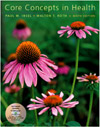Paul M. Insel,
Stanford University School of Medicine
Walton T. Roth,
Stanford University School of Medicine
General Information
|
Addiction: Close to Home
(http://www.pbs.org/wnet/closetohome/home.html)
Created to accompany a PBS television series on addiction, this site provides information about prevention, treatment, and public policy; it also includes animated illustrations of how drugs affect the brain. |
 |
 |
 |
Addiction Science Research and Education Center
(http://www.utexas.edu/research/asrec)
Provides facts and myths about drugs and drug use and abuse. |
 |
 |
 |
American Council for Drug Education
(http://www.acde.org)
Provides resources for substance abuse prevention and education geared toward health professionals, educators, parents, and youth. |
 |
 |
 |
American Society of Addiction Medicine
(http://asam.org)
Provides information to educate physicians and improve the treatment of individuals suffering from alcoholism or other addictions; also contains links to other addiction-related web sites, abstracts from the society's journal, and public policy statements. |
 |
 |
 |
Center for Substance Abuse Research (CESAR)/University of Maryland, College Park
(http://www.cesar.umd.edu)
Provides overviews of key topics, a substance-abuse bulletin board, and an online student risk assessment. |
 |
 |
 |
Do It Now Foundation
(http://www.doitnow.org)
Provides youth-oriented information about drugs. |
 |
 |
 |
Frontline: Drug Wars
(http://www.pbs.org/wgbh/pages/frontline/shows/drugs)
Includes information on key drugs, drug abusers, and the issues surrounding the America's "war on drugs." |
 |
 |
 |
Go Ask Alice
(http://www.goaskalice.columbia.edu)
Professional health educators provide answers to questions on many topics relating to drug use; sponsored by the Columbia University Health Education Program. |
 |
 |
 |
Habitsmart
(http://www.habitsmart.com)
Contains information about addictive behavior, including tips for effectively managing problematic habitual behaviors, a self-scoring alcohol check-up, and links. |
 |
 |
 |
Healthtouch: Drug and Alcohol Abuse
(http://www.healthtouch.com)
Provides facts sheets on many illicit drugs. |
 |
 |
 |
Higher Education Center for Alcohol and Other Drug Prevention
(http://www.edc.org/hec)
Gives information about alcohol and drug abuse on college campuses and links to related sites; contains an area designed specifically for students. |
 |
 |
 |
Indiana Prevention Resource Center
(http://www.drugs.indiana.edu)
Clearinghouse of information and links on substance-abuse topics, including specific psychoactive drugs and issues such as drug testing and drug legalization. |
 |
 |
 |
Monitoring the Future Study
(http://monitoringthefuture.org)
Provides data from an ongoing national survey about drug and alcohol use among high school and college students. |
 |
 |
 |
National Center on Addiction and Substance Abuse (CASA) at Columbia University
(http://www.casacolumbia.org)
Provides information about the costs of substance abuse to individuals and society and assesses efforts at prevention, treatment, and law enforcement. |
 |
 |
 |
National Clearinghouse for Alcohol and Drug Information
(http://www.health.org)
Provides statistics, information, and publications on substance abuse, including resources for people who want to help friends and family members overcome substance-abuse problems; a separate menu of information on preventing substance abuse on college campuses is also available. |
 |
 |
 |
National Institute on Drug Abuse (NIDA)
(http://www.nida.nih.gov)
Provides fact sheets on many specific drugs and drug-related issues. |
 |
 |
 |
South Coast Drug Information: Image Gallery
(http://www.jeweldesigns.com/scdi/images.htm)
Includes images of drugs of abuse and drug paraphernalia. |
 |
 |
 |
StopDrugs.Org
(http://www.stopdrugs.org)
Provides information about drug prevention and treatment and includes photos of street drugs for identification. |
 |
 |
 |
Student Counseling Virtual Pamphlet Collection
(http://counseling.uchicago.edu/vpc)
Includes links to online pamphlets on alcohol and substance use and abuse. |
 |
 |
 |
Substance Abuse and Mental Health Services Administration (SAMHSA)
(http://www.samhsa.gov)
Provides statistics, information, and other resources relating to substance-abuse prevention and treatment; results of the annual National Household Survey on Drug Abuse, which includes current statistics and long-term trends, are available at the site. |
 |
 |
 |
U.S. Drug Enforcement Agency (DEA)
(http://www.usdoj.gov/dea)
Supplies information and statistics on psychoactive drugs and U.S. drug enforcement activities; the online version of the publication Drugs of Abuse includes information about (and photographs of) specific drugs; the Get It Straight site features information on drugs geared toward teens. |
 |
 |
 |
Web of Addictions
(http://www.well.com/user/woa)
Provides a wealth of information about substance abuse and dependence, including fact sheets, contact information for relevant agencies and organizations, and links to related sites. |
Advocacy/Policy/Enforcement
|
Drug Use is Life Abuse/Project No Gangs
(http://www.duila.org)
Contains information about how communities and individuals can organize to stop drug use and gangs. |
 |
 |
 |
Join Together Online
(http://www.jointogether.org)
Provides resources and a meeting place for communities working to reduce substance abuse and gun violence. |
 |
 |
 |
Office of National Drug Control Policy (ONDCP)
(http://www.whitehousedrugpolicy.gov)
Gives information on national and international drug-related topics, including U.S. policies relating to prevention, education, treatment, and enforcement; the ONDCP also sponsors a site geared toward children and teens. |
 |
 |
 |
Partnership for a Drug-Free America
(http://www.drugfreeamerica.org)
An organization seeking to reduce the demand for illegal drugs by changing public attitudes about drugs to make them seem less glamorous and less acceptable. |
 |
 |
 |
United Nations Office for Drug Control and Crime Prevention
(http://www.undcp.org)
Provides information from the United Nations agency focusing on illicit drugs and international crime. |
 |
 |
 |
U.S. Drug Enforcement Agency
(http://www.usdoj.gov/dea)
Supplies information and statistics on psychoactive drugs and U.S. drug enforcement activities; the online version of the publication Drugs of Abuse includes information and photographs of specific drugs and outlines the federal penalties for drug trafficking. |



 2002 McGraw-Hill Higher Education
2002 McGraw-Hill Higher Education